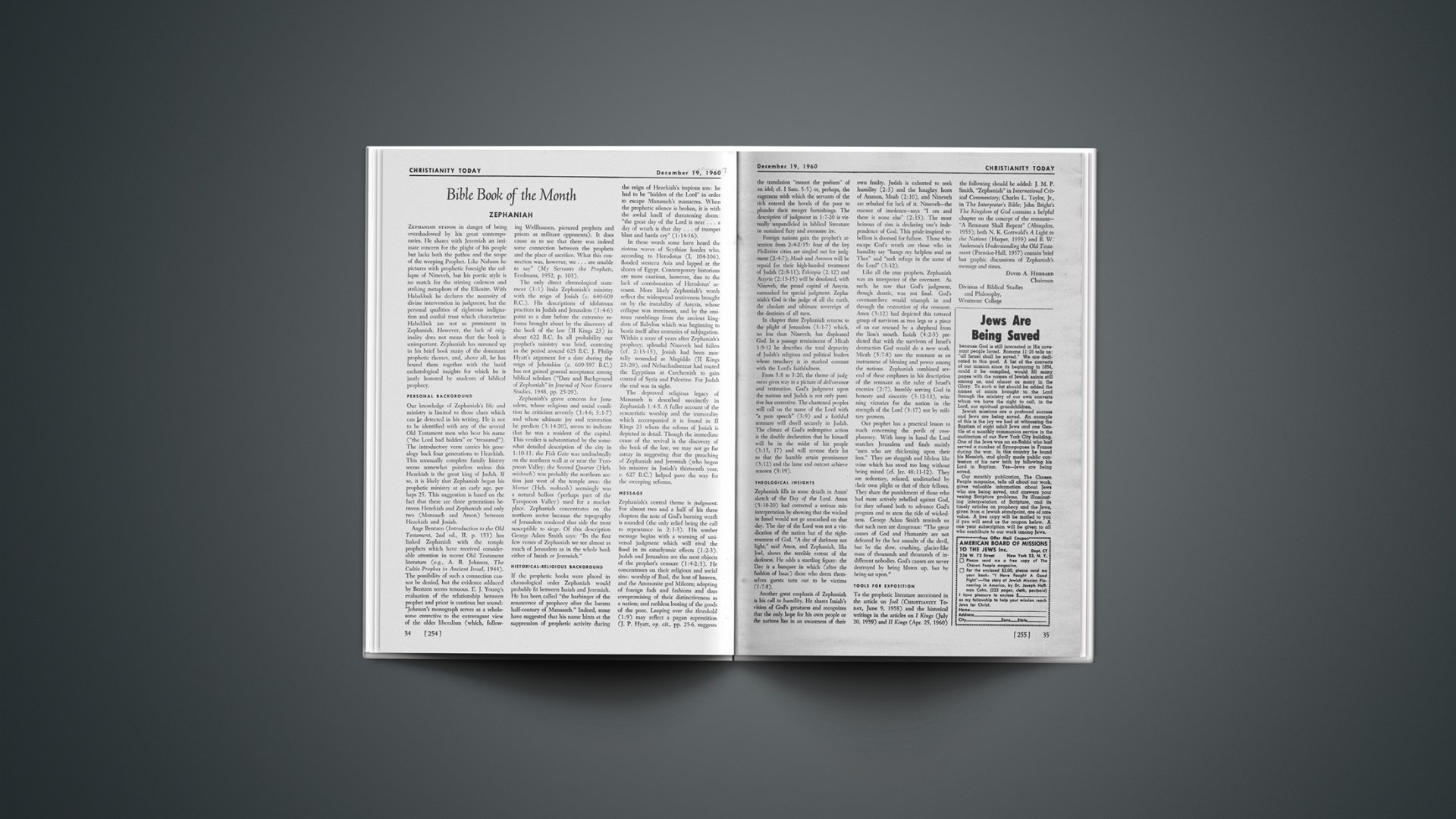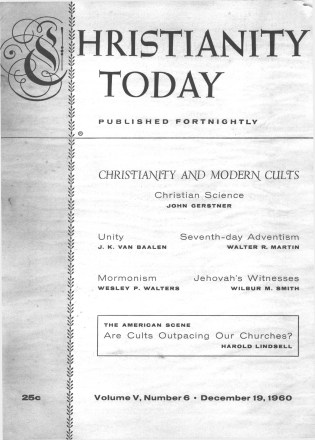Zephaniah stands in danger of being overshadowed by his great contemporaries. He shares with Jeremiah an intimate concern for the plight of his people but lacks both the pathos and the scope of the weeping Prophet. Like Nahum he pictures with prophetic foresight the collapse of Nineveh, but his poetic style is no match for the stirring cadences and striking metaphors of the Elkosite. With Habakkuk he declares the necessity of divine intervention in judgment, but the personal qualities of righteous indignation and cordial trust which characterize Habakkuk are not so prominent in Zephaniah. However, the lack of originality does not mean that the book is unimportant. Zephaniah has summed up in his brief book many of the dominant prophetic themes, and, above all, he has bound them together with the lucid eschatological insights for which he is justly honored by students of biblical prophecy.
PERSONAL BACKGROUND
Our knowledge of Zephaniah’s life and ministry is limited to those clues which can be detected in his writing. He is not to be identified with any of the several Old Testament men who bear his name (“the Lord had hidden” or “treasured”). The introductory verse carries his genealogy back four generations to Hezekiah. This unusually complete family history seems somewhat pointless unless this Hezekiah is the great king of Judah. If so, it is likely that Zephaniah began his prophetic ministry at an early age, perhaps 25. This suggestion is based on the fact that there are three generations between Hezekiah and Zephaniah and only two (Manasseh and Amon) between Hezekiah and Josiah.
Aage Bentzen (Introduction to the Old Testament, 2nd ed., II, p. 153) has linked Zephaniah with the temple prophets which have received considerable attention in recent Old Testament literature (e.g., A. R. Johnson, The Cultic Prophet in Ancient Israel, 1944). The possibility of such a connection cannot be denied, but the evidence adduced by Bentzen seems tenuous. E. J. Young’s evaluation of the relationship between prophet and priest is cautious but sound: “Johnson’s monograph serves as a wholesome corrective to the extravagant view of the older liberalism (which, following Wellhausen, pictured prophets and priests as militant opponents). It does cause us to see that there was indeed some connection between the prophets and the place of sacrifice. What this connection was, however, we … are unable to say” (My Servants the Prophets, Eerdmans, 1952, p. 103).
The only direct chronological statement (1:1) links Zephaniah’s ministry with the reign of Josiah (c. 640–609 B.C.). His descriptions of idolatrous practices in Judah and Jerusalem (1:4–6) point to a date before the extensive reforms brought about by the discovery of the book of the law (2 Kings 23) in about 622 B.C. In all probability our prophet’s ministry was brief, centering in the period around 625 B.C. J. Philip Hyatt’s argument for a date during the reign of Jehoiakim (c. 609–597 B.C.) has not gained general acceptance among biblical scholars (“Date and Background of Zephaniah” in Journal of Near Eastern Studies, 1948, pp. 25–29).
Zephaniah’s grave concern for Jerusalem, whose religious and social condition he criticizes severely (1:4–6; 3:1–7) and whose ultimate joy and restoration he predicts (3:14–20), seems to indicate that he was a resident of the capital. This verdict is substantiated by the somewhat detailed description of the city in 1:10–11: the Fish Gate was undoubtedly on the northern wall at or near the Tyropoeon Valley; the Second Quarter (Heb. mishneh) was probably the northern section just west of the temple area: the Mortar (Heb. maktesh) seemingly was a natural hollow (perhaps part of the Tyropoeon Valley) used for a marketplace. Zephaniah concentrates on the northern sector because the topography of Jerusalem rendered that side the most susceptible to siege. Of this description George Adam Smith says: “In the first few verses of Zephaniah we see almost as much of Jerusalem as in the whole book either of Isaiah or Jeremiah.”
HISTORICAL-RELIGIOUS BACKGROUND
If the prophetic books were placed in chronological order Zephaniah would probably fit between Isaiah and Jeremiah. He has been called “the harbinger of the renascence of prophecy after the barren half-century of Manasseh.” Indeed, some have suggested that his name hints at the suppression of prophetic activity during the reign of Hezekiah’s impious son: he had to be “hidden of the Lord” in order to escape Manasseh’s massacres. When the prophetic silence is broken, it is with the awful knell of threatening doom: “the great day of the Lord is near … a day of wrath is that day … of trumpet blast and battle cry” (1:14–16).
In these words some have heard the riotous waves of Scythian hordes who, according to Herodotus (I, 104–106), flooded western Asia and lapped at the shores of Egypt. Contemporary historians are more cautious, however, due to the lack of corroboration of Herodotus’ account. More likely Zephaniah’s words reflect the widespread restiveness brought on by the instability of Assyria, whose collapse was imminent, and by the ominous rumblings from the ancient kingdom of Babylon which was beginning to bestir itself after centuries of subjugation. Within a score of years after Zephaniah’s prophecy, splendid Nineveh had fallen (cf. 2:13–15), Josiah had been mortally wounded at Megiddo (2 Kings 23:29), and Nebuchadnezzar had routed the Egyptians at Carchemish to gain control of Syria and Palestine. For Judah the end was in sight.
The depraved religious legacy of Manasseh is described succinctly in Zephaniah 1:4–5. A fuller account of the syncretistic worship and the immorality which accompanied it is found in 2 Kings 23 where the reform of Josiah is depicted in detail. Though the immediate cause of the revival is the discovery of the book of the law, we may not go far astray in suggesting that the preaching of Zephaniah and Jeremiah (who began his ministry in Josiah’s thirteenth year, c. 627 B.C.) helped pave the way for the sweeping reforms.
MESSAGE
Zephaniah’s central theme is judgment. For almost two and a half of his three chapters the note of God’s burning wrath is sounded (the only relief being the call to repentance in 2:1–3). His somber message begins with a warning of universal judgment which will rival the flood in its cataclysmic effects (1:2–3). Judah and Jerusalem are the next objects of the prophet’s censure (1:4–2:3). He concentrates on their religious and social sins: worship of Baal, the host of heaven, and the Ammonite god Milcom; adopting of foreign fads and fashions and thus compromising of their distinctiveness as a nation; and ruthless looting of the goods of the poor. Leaping over the threshold (1:9) may reflect a pagan superstition (J. P. Hyatt, op. cit., pp. 25–6, suggests the translation “mount the podium” of an idol; cf. 1 Sam. 5:5) or, perhaps, the eagerness with which the servants of the rich entered the hovels of the poor to plunder their meager furnishings. The description of judgment in 1:7–20 is virtually unparalleled in biblical literature in sustained fury and awesome ire.
Foreign nations gain the prophet’s attention from 2:4–2:15: four of the key Philistine cities are singled out for judgment (2:4–7); Moab and Ammon will be repaid for their high-handed treatment of Judah (2:8–11); Ethiopia (2:12) and Assyria (2:13–15) will be desolated, with Nineveh, the proud capital of Assyria, earmarked for special judgment. Zephaniah’s God is the judge of all the earth, the absolute and ultimate sovereign of the destinies of all men.
In chapter three Zephaniah returns to the plight of Jerusalem (3:1–7) which, no less than Nineveh, has displeased God. In a passage reminiscent of Micah 3:9–12 he describes the total depravity of Judah’s religious and political leaders whose treachery is in marked contrast with the Lord’s faithfulness.
From 3:8 to 3:20, the theme of judgment gives way to a picture of deliverance and restoration. God’s judgment upon the nations and Judah is not only punitive but corrective. The chastened peoples will call on the name of the Lord with “a pure speech” (3:9) and a faithful remnant will dwell securely in Judah. The climax of God’s redemptive action is the double declaration that he himself will be in the midst of his people (3:15, 17) and will reverse their lot so that the humble attain prominence (3:12) and the lame and outcast achieve renown (3:19).
THEOLOGICAL INSIGHTS
Zephaniah fills in some details in Amos’ sketch of the Day of the Lord.Amos (5:18–20) had corrected a serious misinterpretation by showing that the wicked in Israel would not go unscathed on that day. The day of the Lord was not a vindication of the nation but of the righteousness of God. “A day of darkness not light,” said Amos, and Zephaniah, like Joel, shows the terrible extent of the darkness. He adds a startling figure: the Day is a banquet in which (after the fashion of Isaac) those who deem themselves guests turn out to be victims (1:7–8).
Another great emphasis of Zephaniah is his call to humility. He shares Isaiah’s vision of God’s greatness and recognizes that the only hope for his own people or the nations lies in an awareness of their own frailty. Judah is exhorted to seek humility (2:3) and the haughty hosts of Ammon, Moab (2:10), and Nineveh are rebuked for lack of it. Nineveh—the essence of insolence—says “I am and there is none else” (2:15). The most heinous of sins is declaring one’s independence of God. This pride-inspired rebellion is doomed for failure. Those who escape God’s wrath are those who in humility say “hangs my helpless soul on Thee” and “seek refuge in the name of the Lord” (3:12).
Like all the true prophets, Zephaniah was an interpreter of the covenant. As such, he saw that God’s judgment, though drastic, was not final. God’s covenant-love would triumph in and through the restoration of the remnant.Amos (3:12) had depicted this tattered group of survivors as two legs or a piece of an ear rescued by a shepherd from the lion’s mouth. Isaiah (4:2–3) predicted that with the survivors of Israel’s destruction God would do a new work. Micah (5:7–8) saw the remnant as an instrument of blessing and power among the nations. Zephaniah combined several of these emphases in his description of the remnant as the ruler of Israel’s enemies (2:7), humbly serving God in honesty and sincerity (3:12–13), winning victories for the nation in the strength of the Lord (3:17) not by military prowess.
Our prophet has a practical lesson to teach concerning the perils of complacency. With lamp in hand the Lord searches Jerusalem and finds mainly “men who are thickening upon their lees.” They are sluggish and lifeless like wine which has stood too long without being mixed (cf. Jer. 48:11–12). They are sedentary, relaxed, undisturbed by their own plight or that of their fellows. They share the punishment of those who had more actively rebelled against God, for they refused both to advance God’s program and to stem the tide of wickedness. George Adam Smith reminds us that such men are dangerous: “The great causes of God and Humanity are not defeated by the hot assaults of the devil, but by the slow, crushing, glacier-like mass of thousands and thousands of indifferent nobodies. God’s causes are never destroyed by being blown up, but by being sat upon.”
TOOLS FOR EXPOSITION
To the prophetic literature mentioned in the article on Joel(CHRISTIANITY TODAY, June 9, 1958) and the historical writings in the articles on I Kings (July 20, 1959) and II Kings (Apr. 25, 1960) the following should be added: J. M. P. Smith, “Zephaniah” in International Critical Commentary; Charles L. Taylor, Jr., in The Interpreter’s Bible; John Bright’s The Kingdom of God contains a helpful chapter on the concept of the remnant—“A Remnant Shall Repent” (Abingdon, 1953); both N. K. Gottwald’s A Light to the Nations (Harper, 1959) and B. W. Anderson’s Understanding the Old Testament (Prentice-Hall, 1957) contain brief but graphic discussions of Zephaniah’s message and times.
DAVID A. HUBBARD
Chairman
Division of Biblical Studies and Philosophy,
Westmont College










